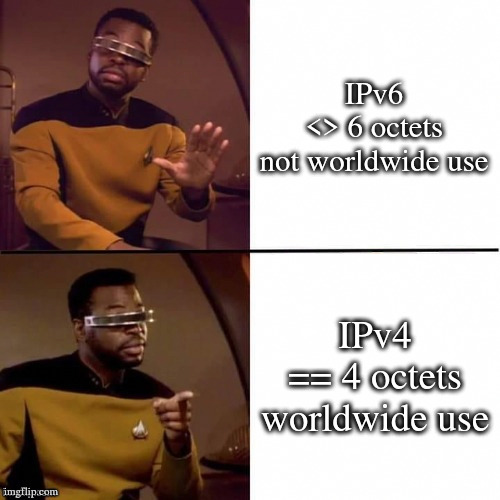this post was submitted on 19 Jun 2024
306 points (85.4% liked)
Programmer Humor
19918 readers
2158 users here now
Welcome to Programmer Humor!
This is a place where you can post jokes, memes, humor, etc. related to programming!
For sharing awful code theres also Programming Horror.
Rules
- Keep content in english
- No advertisements
- Posts must be related to programming or programmer topics
founded 2 years ago
MODERATORS
you are viewing a single comment's thread
view the rest of the comments
view the rest of the comments

I felt dirty! and broke so much shit when i had to implement NAT on networks in the mid 90's. Nowdays with ipv6 and getting rid of NAT is much more liberating. The difference is staggering!
Now the greatest and best effect of ipv6 is none of the above. It is that with ipv6 we have a slim hope of reclaiming some of what made the Internet GREAT in the first place. When we all stood on equal footing. Anyone could host their own service. Now we are all vassals of the large companies that have made the common person into a CGNAT4444 using consumer mindlessly lapping up what the large company providers sees fit to provide us. with no way to even try to be a real and true part of the Internet. Fight the companies that want to make you a eyeball in their statistic, Set up your own IPv6 service on the Internet today !
Imagine actually having ipv6 available through your ISP.
...and ever if my ISP actually provided one, getting a static one costs money so there's no difference in the end.
I guess I am lucky. 3 out of 3 isp's available from in my region provide IPv6 with a dhcp-pd assigned stable address by default. (Norway)
Yeah, here in Russia the ISPs and IT infrastructure guys seem to be treating IPv6 like it has cooties. I can't find an article (and it'd be in russian anyway) but as far back as 2022, if you get IPv6 you can expect a variety of issues with it, ranging from "you need to reboot your router every once in a while" to "you technically have v6 but good luck actually browsing v6 internet".
And of course, why would they give you a stable IP when they can charge for it :T. At least it's only a third the price of a stable IPv4.
My current ISP technically provides v6 according to their site - but my connection doesn't have it, and since there's nothing about it in the years-old contract, I'd need to redo that if I want to complain.
You have my sympathy. I do not know of a sure way to get isp's to behave. Espesially not if they have regional monopoly
There are usually plenty of choices for ISPs here, actually. But switching between them isn't likely to give me IPv6 since either they share a magistral or the hardware is just plain old. That, and IPv6 is just not a thing anyone markets.
...and with the current fuckery going on, I doubt many of them have budget for big upgrades. Or maybe even access to hardware to buy.